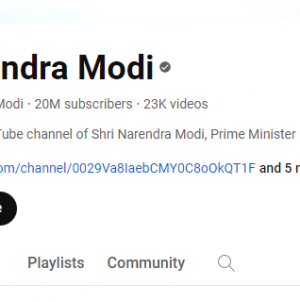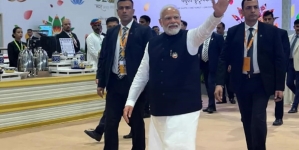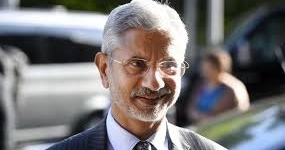-
LONDON: Run For Modi” Event In London To Drum Up Support For PM Modi - 7 hours ago
-
LONDON: Indian-Origin Candidate On How He Plans To Win London Mayoral Polls - 1 day ago
-
HARVARD: No Country Is Perfect”: Physics Wallah Urges Indian Students At Harvard, Stanford To Return - April 27, 2024
-
CALIFORNIA: PM Modi Put India On World Map As Credible Innovator- IT Industry Leaders - April 26, 2024
-
WASHINGTON: Indian Students Bag NASA Awards For Human Exploration Rover Challenge - April 25, 2024
-
LONDON: Indian-Origin Teen In UK Gets “Life-Changing” Cancer Treatment - April 25, 2024
-
SILICON VALLEY: All About Pavan Davuluri, New Head Of Microsoft Windows - April 25, 2024
-
LONDON: UK’s India Gate To Commemorate Role Of Indian Soldiers From World Wars - April 24, 2024
-
HARARE: Shri Bramha Kumar appointed as the next Ambassador of India to the Republic of Zimbabwe - April 23, 2024
-
LONDON: Indian-Origin Principal Wins UK Legal Challenge Over School Prayer Ban - April 23, 2024
NEW DELHI: ‘Happy to see economic recovery’: FM Nirmala Sitharaman
NEW
DELHI: Days
after announcing the mechanics of the bad bank that will remove ₹2 lakh crore
of bad debt from the books of banks, and weeks after announcing a framework
that will make more people eligible for loans and scrapping the retrograde
retrospective tax, finance minister Nirmala Sitharaman discussed these, and the
state of the economy, in an extensive interview. Edited excerpts:
You
announced on Thursday that the government will provide ₹30,600 crore in
guarantees to the National Asset Reconstruction Company Ltd to buy ₹2 lakh
crore of bad loans from banks. This will be in a 15:85 split, with NARCL
offering banks cash for 15% of the value of the assets and issuing security
receipts for the rest (partly guaranteed by the government), which the banks
can sell in the market. Do you think there will be appetite for these
securities?
Yes. That
these assets have been sitting without resolution need not give us the
impression that they have no value. The resolution formula is the one that will
be given priority. Not liquidation. When you look at resolution – there is an
implicit message being given that these are workable assets, and that with some
doing they will be valuable.
There
will definitely be interest in the market.I lay a lot of emphasis on the
professionals (managing the assets), which is why, along with NARCL, we have
set up India Debt Resolution Company Ltd. It will have panels of experts;
panels because the assets belong to various categories. These panels will deal
with assets in domains in which they have expertise. With that kind of
specialised application of mind on each of these assets, we think they will be
made up in such a way, and valued in such a way, that the market will find it
interesting. Bank officials do not have that kind of specialisation.
IDRCL is
key to this, right?
IDRCL is
49% owned by the banks themselves; the Indian Banks Association will have to
drive the process as these assets belong to the banks; IBA will have greater
oversight on this. It is in their interest to have these run
efficiently.There’s also a fee (against the guarantee) that NARCL will have to
pay (to the government); the fee becomes higher with time; so the sooner you
sell an asset, the better it is.
Are you
confident this will work?
Yes,
because this entire mechanism was driven by the banks; many of these big-ticket
exposures are through consortia; unless all banks agree, no resolution is
possible. Now because it’s through IBA, it’s for them to constantly keep moving
towards better resolution, towards consensus.
So
something we have all been talking about for ages — a bad bank — is finally
here.
In a
slightly different formation which will be a lot more transparent and owned by
the banks themselves. In a country like the US, 99% of the banks are private.
In India you have the public sector holding a big share.
Is this a
transient mechanism?
At this
stage, we are not describing what happens after five years. ₹2 lakh crore will
have to be cleared in five years. Beyond that I envisage that the banks
themselves will be professional enough to figure out how they are going to
handle their non-performing assets. If at that time — small asset
reconstruction companies are not able to handle assets over ₹500 crore, and
that is why we said this mechanism is for assets of ₹500 crore and above —
there is a need to continue with this for larger assets, they will continue.
The
misuse of a section of the Insolvency and Bankruptcy Code (IBC), where
creditors agree to take huge haircuts, sometimes in excess of 90% on even good
underlying assets, has resulted in demands for strengthening the law. Do you
agree?
Yes and
no. Where the haircuts are so significant, I think some banks have also been
sitting up and saying we can’t accept this. In one recent case that resulted in
a 98% haircut, I was glad that two banks voiced dissent, and they also probably
went to the court and sought a stay. Such course corrections highlight that the
weakness is not IBC itself but in the way the issues are being resolved. So I
would look for a solution to that rather than tinkering with the act itself.
Where amendments are required to strengthen the act, I am in favour of them.
But in practice, if there are ways in which people are either gaming it or
conveniently giving an inference that is, in spirit, not in line with the law,
I think other ways of legal redressal are required. It is not a weakness in IBC
but in how people are gaming it. So we will have to see both – I am happy to
strengthen IBC because it is one of the better ways of resolving; it focuses on
resolution of a going concern rather than liquidation.
India
recently announced the launch of Account Aggregators (AAs allow individuals and
enterprises to share credit and financial information relating to their
accounts or transactions with one financial or service entity with others, with
their explicit permission, so as to prove their credit worthiness) which could
broaden the credit base even as it makes it easier for financial institutions
to lend. How do you see the acceptance of these?
The small
and medium enterprises and the middle class will benefit from this. We are all
worried about data privacy, and while there is a data privacy law that will
come, taking this avenue to provide comfort to borrowers has been received
well. I think the fact that people have grasped the details of AA shows that
people are willing to see how it helps optimise the system.
Are
nudges required? AAs will become stronger only if more organisations with which
people have dealings, telecom companies for instance, become part of the
network.
Nudges
are required for many things the government is doing – even small digital
adaptations that people have to do. A lot of small nudges have been happening
in the past year, and that is evident in the way UPI (United Payments
Interface) has been growing – we are extending it to overseas Indians now. The
AA framework also needs a nudge. This is a great leap forward.
But like
you said, a privacy law and a data protection framework are needed.
Necessary
consultations will have to happen. They can’t be bypassed. If the stakeholders
are brought on board; [if] their inputs are used to strengthen the law – then
there is greater acceptability when it is passed. I don’t think there will be a
delay; the more the consultation, the better it is. That process will be done.
India has
been ahead of the curve on many things – UPI, for instance, and AAs, but seems
to be lagging behind on adopting cryptocurrencies.
It may
not be the best example, but take El Salvador. The way in which they went ahead
to accept it (Bitcoin) as a currency. You’d think common people don’t care
about digital currency; but the public took to the streets against the move.
It’s not a question of literacy or understanding – it’s also a question of to
what extent this is a transparent currency; is it going to be a currency
available for everyone? El Savador may be an exceptional place where they tried
some experimentation. There are other countries that are talking about the
central bank having a legitimate cryptocurrency. That could be a possibility.
A lot of
consultation took place; RBI’s views were also taken; now we have to formulate
this in the form of a Cabinet note on the balance we can strike. This is not an
era where you can say I don’t care about what’s happening, or we don’t want to
do anything. At the same time, are we yet ready to go the El Salvador way? We
have to be sure that a futuristic thing can’t be shut out.
I
remember one edit writer for Mint suggesting four-five years ago that we should
have our own Bharatcoin.
We have
to evolve something suitable for our systems. India has the strength of the
technology; fintech gives us the command over the instrumentalities with which
you can play; our economy is full of possibilities. So we have to be cautious;
but we have to think it through.
You
recently scrapped the controversial retrospective tax and also offered a
resolution for companies slapped with this tax. What has been the response,
especially from companies such as Cairn and Vodafone?
It’s been
positive. We have had a round of discussions and haven’t heard any voices of
discord. One of them had paid, and the government will have to pay them back
but that should close the chapter, we shall not pay interest, etc. And they
should end all litigation. Those details are being worked out.
Vodafone
is also a shareholder in Vodafone Idea, which is a beneficiary of the telecom
package your government announced recently. Do you think enough has been done
for the sector?
Definitely.
The way in which the package has come – it also brings in reforms. It removes a
lot of anomalies, and constraints. Business has been given space to breathe.
Government wants that sector to be run in a free manner and also have more than
two or three players. For free and fair competition, markets should be given
play; and customers will benefit.
But with
companies being allowed to pay some of the amounts being deferred under a
moratorium through equity, the government could end up owing chunks of Indian
telecom.
I think
it will be a special undertaking (a company set up for that purpose), not the
government.
Are you happy
with the pace of economic recovery?
I’m happy
to see recovery; at this stage we want to have very positive signs from all
segments so that mutually they create this thing called sentiment. If sentiment
becomes positive, it creates a multiplier effect.
What is
your take on the growth vs inflation debate?
I don’t
think they are mutually exclusive. It is possible to have some level of
inflation without affecting consumers. And growth need not be curbed because of
inflation. Our push for growth will continue.
At last
week’s GST Council meeting, it was decided the timing for moving fuel under GST
was not appropriate. When will it be?
To a
large extent, that depends on states feeling comfortable. States feel that they
have very few items on which they can have a consideration to increase or
decrease tax. Tax on fuel, liquor are in their hands. They feel that at this
time they need to have revenues, and reach a level where they can let it go. I
wouldn’t want to push states at a time like this. A post-Corona situation is
not the kind of circumstance in which any state will have a comfort level (with
doing this). At this stage, I am also not holding back any money that is due to
them; and we are also ensuring they can borrow more.
You have
extended the cess but states have been asking for an extension on compensation,
which under the GST Act ends next year.
In the
43rd council meeting in October 2020 it was decided that the borrowing
undertaken to meet the compensation can only be paid from cess, so it needs to
be extended. Those amounts borrowed last year, and the amount we have to borrow
this year despite higher revenues and paying up the dues — just to pay back
the borrowed amount, we need to continue cess till March 2026. By law,
compensation can be paid from cess at 14% for five years. This is being duly
complied with. Beyond 2022, compensation need not be given, but cess has
already been extended for paying the loan already taken till 2026. Where is the
possibility of extending compensation?
So, there
will be a shortfall in compensation this year also?
There
will be a little shortfall in compensation, and this year also we will have to
borrow.
Will you
follow the same formula as last year?
Yes, we
will.
Coming to
the issue of excise on fuel, would the government consider cutting excise to
bring down prices?
The only
very strong case for me to put forward – excise levied by the Centre is not
value added; it is fixed. If it were value added, each time the price
increases, it goes up. And prices are going up. So, I have to balance this with
what’s happening in the states (Editor’s Note: Tax on fuel levied by the state
is value added). It’s also a question of time. I won’t be able to comment on it
beyond that.
Do you
worry about a possible taper tantrum and money exiting Indian markets if
interest rates overseas are raised?
There’s
no point worrying; it’s more for the government and RBI to keep watch and
smoothen any impact here; you can sense it in time if you keep a watch. There
is a conscious effort to do this by RBI and the government. We are keeping a
watch.
There’s
been a push by some countries to have India agree to net zero commitment on
emissions. This could have an economic impact. What are your thoughts on this
issue?
The
principle that the defaulter should pay holds good. The legacy units we may
have are still not of that volume as that, which ages ago, the developed world
benefited from; today, they can say these are environmentally unfriendly. If
countries like us have to meet our development requirements, you’d still have
to have some thermal units; coal dependence will be there to some extent. We
are committed to closing legacy thermal units that are inefficient, coal
guzzlers which have poor productivity levels, but completely removing thermal is
impossible. Our economy has different regions at differing levels of
development. We still have active mines. India speaking on this should be taken
seriously because the PM has invested and is committed in renewable energy.
Till now, what we have achieved in terms of our commitment in COP 21 have all
been achieved with India’s own funds. That $100 billion supposed to be given to
developing countries (by developed countries) has not even materialised. We
have completely fulfilled our commitment in COP 21 but I don’t think we can
rush into net zero.
Last
question. Are you satisfied with where India is now?
I feel
reassured. Indians have faced it all (because of Covid), have suffered, and
have shown grit to come out of it. How much ever you do — and our government
tried doing as much as it could – will not be enough. This is the kind of
pandemic the world has not seen before, so I am willing to hear everything
people say of what we could have done [better] and so on. But I am immensely
grateful to the people of India. And looking at the way the vaccination drive
is progressing, I feel we will come through it.
























